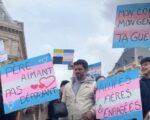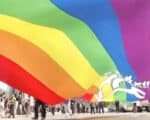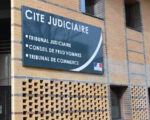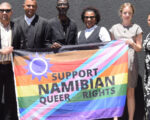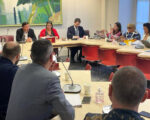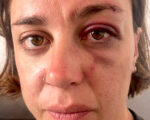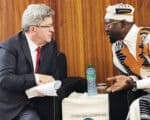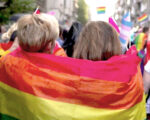>> Gay Rights Supporters Win 2nd Victory at the United Nations
[spacer]
L’Assemblée générale des Nations Unies a suivi la décision de la commission du 21 novembre dernier, retoquant ce lundi l’initiative des 54 pays Africains pour empêcher la nomination d’un spécialiste indépendant chargé d’enquêter sur les violences et les discriminations subies par les membres de la communauté LGBT dans le monde.
 C’était la seconde tentative du groupe pour faire passer une mesure réclamant des discussions sur le mandat de l’expert, mais leur proposition a été rejetée par 84 voix contre 77 en faveur, et 16 abstentions.
C’était la seconde tentative du groupe pour faire passer une mesure réclamant des discussions sur le mandat de l’expert, mais leur proposition a été rejetée par 84 voix contre 77 en faveur, et 16 abstentions.
Le Conseil des droits de l’homme de l’Onu a nommé à ce poste fin septembre, pour trois ans, un professeur de droit international, le Thaïlandais Vitit Muntarbhorn, qui a pris ses fonctions le mois dernier.
Le Burkina Faso a de nouveau argué, comme le rapporte l’AFP, « qu’il n’y avait aucune base légale à son mandat, ni de reconnaissance internationale selon laquelle l’orientation sexuelle et l’identité homme-femme font partie des droits de l’homme », reflétant ainsi les profondes divisions internationales sur la question.
« Ce n’est pas une question du Nord essayant d’imposer ses valeurs sur le Sud. C’est une question de respect de la dignité et des droits de l’homme de tout le monde, partout », a toutefois estimé Samantha Power, ambassadrice américaine à l’Onu, accusant le groupe des pays africains et leurs alliés de « s’accrocher à un détail de procédure pour masquer leurs préjugés homophobes ».
Selon un rapport des Nations Unies publié l’année dernière, au moins 76 pays ont des lois qui criminalisent les personnes LGBT et relations homosexuelles consensuelles, dont 33 uniquement en Afrique (Ouganda, Nigeria, Soudan, Mauritanie, etc).
Quelque 870 organisations de 157 pays ont pourtant signé une lettre ouverte invitant les nations membres à soutenir et poursuivre les efforts pour améliorer les droits de la communauté, régulièrement mis à mal ces dernières années, par des pays également du Moyen Orient, ainsi que la Chine et la Russie.
Terrence Katchadourian
stophomophobie.org
[spacer]
>> Supporters of gay rights won a major victory at the United Nations on Monday with the failure of a second African attempt to stop the work of the first-ever U.N. independent expert investigating violence and discrimination based on sexual orientation.
After a first defeat Nov. 21 in the General Assembly’s human rights committee, African nations led by Burkina Faso attempted again to suspend the work of LGBT expert during the final General Assembly vote. But the result was almost identical.
The Africans urged the 193-member world body to delay implementation of a resolution adopted by the U.N. Human Rights Council in Geneva in order to determine « the legal basis » for the expert’s mandate. They also sought to suspend the expert, Vitit Muntarbhorn of Thailand, who was appointed on Sept. 30 and has started his work.
But their proposed amendment for a delay and suspension was defeated in the General Assembly by a vote of 77-86, with 16 abstentions. The human rights committee vote had the same number of LGBT supporters and opponents.
African nations said they wanted a delay because « there is no international agreement on the definition of the concept of « sexual orientation and gender identity » ».
U.S. Ambassador Samantha Power, who opposed the African amendment, called this « patently false. »
She said violence and discrimination based on sexual orientation and gender identity are « well established » and have been referred to in U.N. statements and resolutions including in the General Assembly and Security Council.
« In reality, this amendment has little to do with questions around the definition of sexual orientation and gender identity, » Power said. « Instead, this amendment is rooted in a real disagreement over whether people of a certain sexual orientation and gender identity are, in fact, entitled to equal rights. »
While gay rights supporters welcomed the result, the close vote reflected deep international divisions on gay rights.
The U.N. has worked to improve the rights of the LGBT community in recent years but has repeatedly run into opposition from some member states — especially from countries in the Middle East and Africa as well as China and Russia.
According to a U.N. human rights report last year, at least 76 countries retain laws used to criminalize and harass people on the basis of their sexual orientation and gender identity or expression, including laws criminalizing consensual same-sex relationships among adults.
The International Service for Human Rights said 870 organizations from 157 countries around the world signed an open letter urging nations in the General Assembly to continue the LGBT expert’s work.
Pooja Patel, who manages the organization’s LGBT rights program, called Monday’s outcome a victory for equality.
Discrimination and violence faced by lesbian, gay, bisexual and transgender people around the world « is real and needs to be combatted, » she said, and the close vote shows how much work is needed to build bridges with many countries.





